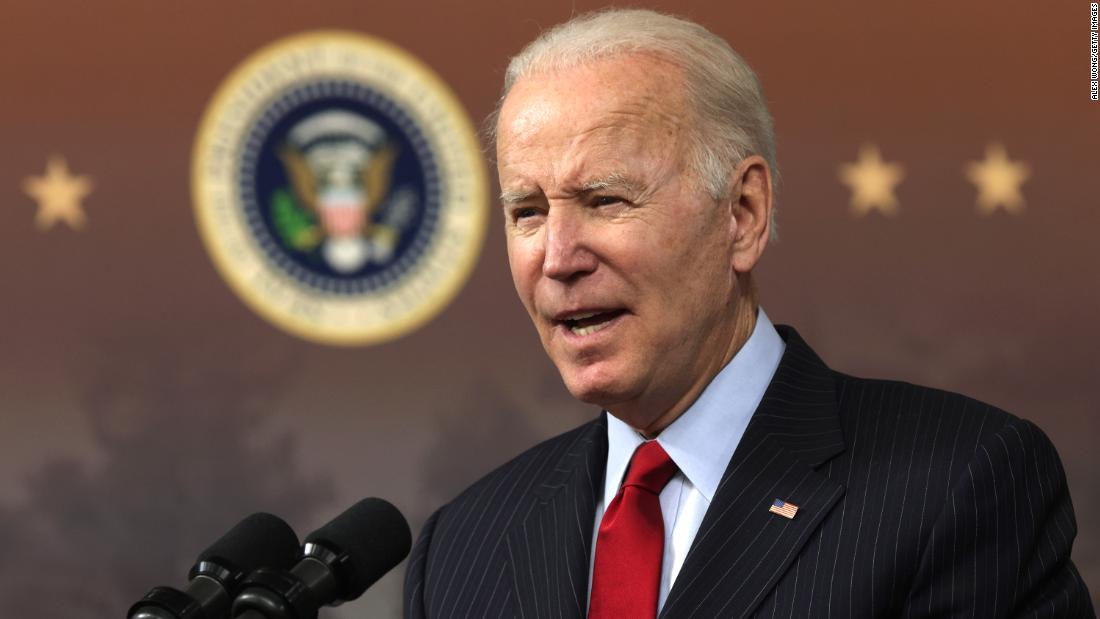
Washington (CNN)President Joe Biden marked World AIDS Day on Wednesday by unveiling a new national HIV/AIDS strategy with the goal of ending the HIV epidemic by 2030.
During a speech at the White House on Wednesday afternoon, the President said the new strategy "centers around the kind of innovative community-driven solutions that we know will work."
"It's a plan to make sure that the latest advances in HIV prevention, diagnosis and treatment are available to everyone regardless of race, age, gender identity, sexual orientation, disability or other factors. It shouldn't matter where you live in the country or how much you make," the President said.
He also noted that the strategy "takes on racial and gender disparities in our health system that for much too long affected HIV outcomes in our country, to ensure that our national responses are truly equitable."
Biden told advocates and allies at the White House event that because of their efforts, "We are within striking distance of eliminating HIV transmission."
"It's because of all of you, and the dedication of scientists and activists around the world, that we've been able to dramatically reduce new HIV transmissions and make individuals with HIV today lead long and healthy lives," Biden said. "And you know, it's because of the persistence and resilience of the HIV community that we've changed so much about where we approach health care research and equitable access to services, and even the relationship between patients and health care providers."
Highlighting $670 million in budget requests for ending the HIV epidemic, Biden told those gathered in the East Room he was "confident" Congress would approve the request, pointing to the fight against HIV/AIDS as "an issue that has a long history of bipartisan support."
"God willing, I want to make sure that everyone in the United States knows their HIV status, and everyone with HIV receives high quality care and treatment that they deserve, and that we end the harmful stigma around HIV and AIDS," Biden said.
The President also took the opportunity to call on states to repeal "HIV criminalization laws that do not reflect an accurate understanding of HIV," asking them to "eliminat[e] laws that perpetuate discrimination, exacerbate disparities, discourage HIV testing and take us further away from our goal."
This World AIDS Day comes 40 years after the US Centers for Disease Control and Prevention officially reported the first cases.
The White House's new strategy -- something Biden had promised on the campaign trail -- provides a "framework and direction for the administration's policies, research, the programs and planning through the year 2025 to lead us toward ending the HIV epidemic in the United States by 2030," a White House official said.
The goals outlined in the strategy include preventing new HIV infections, improving health outcomes for people with HIV, reducing health inequity and establishing a more coordinated effort to address the epidemic. The strategy identifies a number of "priority populations," including Black women, trans women, people ages 13 to 24, people who inject drugs and Black, Latino and American Indian/Alaska Native men.
The official said this plan, which is the nation's third national HIV strategy, is different because of its "whole of government approach," adding that the administration recognizes "racism as a serious public health threat."
"There are several updates in this and some of those new features or new areas of focus have come about from both community input as well as sitting down with our federal partners and thinking about also the priorities of this administration where there is a focus on equity," the senior official said.
Despite the US setting a goal in 1997 to find an HIV vaccine within 10 years, four decades later there is still no vaccine or cure. While new treatments have made the diagnosis more manageable and even helped prevent infection, public health challenges remain.
There are disparities in access to treatment, and Black and Hispanic Americans are disproportionately affected by HIV. Resistance to HIV/AIDS medications also has become increasingly common.
About 1.1 million people in the US were living with HIV at the end of 2019, according to the CDC.
"day" - Google News
December 02, 2021 at 04:14AM
https://ift.tt/3lpzEYF
Biden marks World AIDS Day with new national HIV/AIDS strategy - CNN
"day" - Google News
https://ift.tt/3f7h3fo
https://ift.tt/2VYSiKW
Bagikan Berita Ini














0 Response to "Biden marks World AIDS Day with new national HIV/AIDS strategy - CNN"
Post a Comment